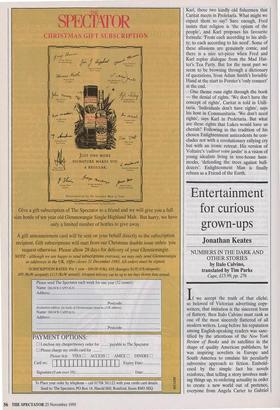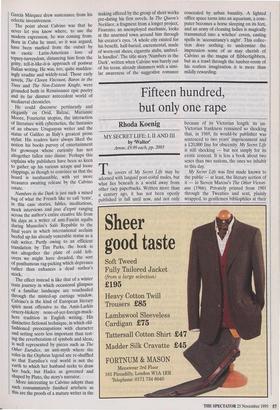Entertainment for curious grown-ups
Jonathan Keates
NUMBERS IN THE DARK AND OTHER STORIES by Italo Calvino, translated by Tim Parks Cape, £15.99, pp. 276 I f we accept the truth of that cliché, so beloved of Victorian advertising copy- writers, that imitation is the sincerest form of flattery, then Italo Calvin() must rank as one of the most sincerely flattered of all modern writers. Long before his reputation among English-speaking readers was sanc- tified by the attentions of the New York Review of Books and its satellites in the shape of quality American publishers, he was inspiring novelists in Europe and South America to emulate his peculiarly subversive approach to fiction. Embold- ened by the simple fact his novels reinforce, that telling a story involves mak- ing things up, re-ordering actuality in order to create a new world out of pretence, everyone from Angela Carter to Gabriel Garcia Marquez drew sustenance from his eclectic inventiveness.
The point about Calvin was that he never let you know where, to use the modem expression, he was coming from. Born in Cuba he must, so it was argued, have been marked from the outset by an exotic Latin-American love of topsey-turveydom, distancing him from the gritty, tell-it-like-it-is approach of postwar Italian writing. He was, too, quite madden- ingly erudite and widely-read. Those early novels, The Cloven Viscount, Baron in the Trees and The Non-Existent Knight, were grounded both in Renaissance epic poetry and its far dimmer antecedent world of mediaeval chronicles.
He could discourse pertinently and elegantly on Ovid, Balzac, Marianne Moore, Fourierist utopias, the interaction of literature with cybernetics, the fantasies of an obscure Uruguayan writer and the status of Galileo as Italy's greatest prose stylist. His readers have always liked the notion his books purvey of entertainment for grownups whose curiosity has not altogether fallen into disuse. Perhaps this explains why publishers have been so keen to gather up his various scraps and loose chippings, as though to convince us that the hoard is inexhaustible, with yet more treasures awaiting release by the Calvino estate.
Numbers in the Dark is just such a mixed bag of what the French like to call 'texts', M this case stories, fables, meditations, mock interviews and jeux d'esprit ranging across the author's entire creative life from his days as a writer of anti-Fascist squibs during Mussolini's Salo Republic to the final years in which international acclaim beefed up his already venerable status as a cult writer. Partly owing to an efficient translation by Tim Parks, the book is not altogether the plate of cold left- overs we might have dreaded, the sort of posthumous rag-picking which depresses rather than enhances a dead author's stock.
The effect instead is like that of a winter train journey in which occasional glimpses of a familiar landscape are vouchsafed through the misted-up carriage window. Calvino's is the kind of European literary spirit most offensive to the Amis-Larkin ornery-blokery none-of-yer-foreign-muck- here tradition in English writing. His distinctive fictional technique, in which old- fashioned preoccupations with character and setting seem less important than test- ing the reverberation of symbols and ideas, is well represented by pieces such as The Other Eurydice, an anti-myth where the roles in the Orpheus legend are re-shuffled so that Eurydice's real world is not the earth to which her husband seeks to draw her back, but Hades as governed and shaped by Pluto, the story's narrator. More interesting to Calvino adepts than such consummately finished artefacts as this are the proofs of a mature writer in the making offered by the group of short works pre-dating his first novels. In The Queen's Necklace, a fragment from a longer project, Fiorenzo, an unemployed mechanic, looks at the unarmed town around him through his creator's eyes. 'A whole city existed for his benefit, half-buried, excremental, made of worn-out shoes, cigarette stubs, umbrel- la handles'. The title story 'Numbers in the Dark', written when Calvino was barely out of his teens, already shimmers with a simi- lar awareness of the suggestive romance concealed by urban banality. A lighted office space turns into an aquarium, a com- puter becomes a horse sleeping on its feet, and an army of cleaning ladies is magically transmuted into a witches' coven, casting spells in 'accountancy's night'. This collec- tion does nothing to undermine the impression some of us may cherish of Calvino as the magus of flibbertigibbets, but as a trawl through the lumber-room of his restless imagination it is more than mildly rewarding.



















































































 Previous page
Previous page